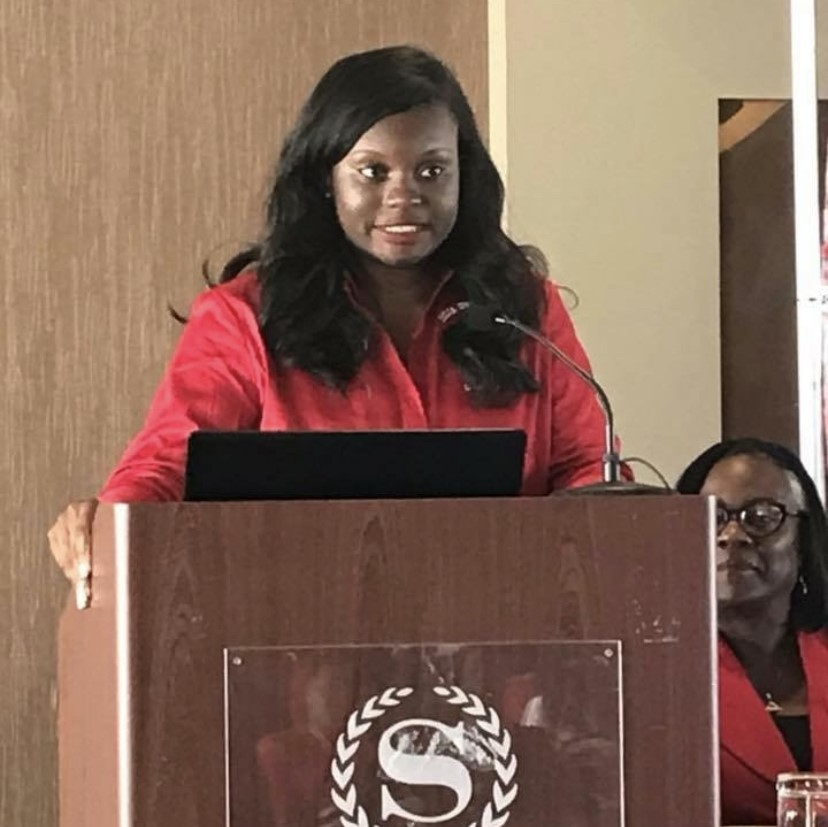
MacKenzie Jenkins is an inspiring, passionate advocate for human rights education. She founded Justice She Wrote in 2016, while pursuing a major in Human Rights and minors in Arabic and Public Policy and international Affairs at Southern Methodist University. A Texas Civic Ambassador, Southwest Regional Representation Representative of Delta Sigma Theta Sorority, and Peer Academic Leader at Southern Methodist University for three consecutive years, Jenkins has always been passionate about leadership and community service. Jenkins’ tagline for Justice She Wrote is “Educate, Empower, and Engage,” and this encompasses perfectly her work as an advocate in her community thus far.
MacKenzie Jenkins was born and raised in Richardson, Texas, and attended the same school, Canyon Creek Christian Academy, for practically her entire adolescent life. For Jenkins, the environment she grew up in informed her political perspective greatly. “Growing up as one of very few black students in my class, if not the only one, really shaped my perspective on the world. I had a very good, diverse background with a lot of educational opportunities,” Jenkins asserted. Her mother is a dedicated, lifelong member of the Delta Sigma Theta sorority, which is very active in educating voters in political action. Jenkins recalls being a small child and watching them register voters. For her, these experiences impassioned her and taught her at a very young age the importance and power of her voice.
Her first exposure to politics was an impactful trip to Washington, D.C. at the age of eight years old. Jenkins’ mother took her to tour Congresswoman Stephanie Tubbs Jones’ office. She recalls the excitement of seeing someone who looked like her in such a position of power. That experience impassioned Jenkins to become more involved in learning about American history, and she recalls her first role model being Harriet Tubman. Inspired by her courageousness and her fight for freedom, Jenkins wrote on Harriet Tubman as her book report in middle school three times in a row. “I was in sixth grade and one of my best friends, who was white, asked me why I chose someone black for my book report,” Jenkins recalled. “I wish I would have stood my ground and asked her why she didn’t do someone black, and I did someone white, so that we could’ve learned from each other’s cultures.” Those were some of her most early experiences which laid the foundations for a lifelong dedication and advocacy for the representation of black historical figures and experiences in education.
A dedicated member of the human rights program at SMU, MacKenzie Jenkins’ goal in founding Justice She Wrote was to empower the community by making information on human rights issues and their historical contexts easily accessible. “I wanted to create a space where people could come to learn about historical facts and human rights they might not have learned about in school,” Jenkins explained. By 2017, Justice She Wrote grew from a blog site to a social media powerhouse, with an online presence on Instagram, Twitter, and YouTube. Now, there are posts each Monday focused on the power of music and the arts, and how these mediums play into human rights initiatives and social justice movements. Additionally, there is a section of Justice She Wrote, Justice on Demand, which highlights filmmakers and films that explore social justice issues. These posts engage and educate the community, empowering them to take action with the knowledge that their voice matters.
The greatest issue facing the community, in Jenkins’ eyes, is education. When she graduated from Southern Methodist University in 2018, she became a teacher in Mississippi. Through her work as a teacher and her research for Justice She Wrote, she realized the importance of making sure children receive a top-tier education, and that school districts must enforce curriculums that teach students everything they need to know to be well-rounded individuals. In February of 2020, through Justice She Wrote, she organized a screening of Pushout, a book by Dr. Monique Morris on the criminalization of black girls in schools. This event was very important to Jenkins, because it gave her an opportunity to get members of the community involved in the conversation surrounding education. Toni Rose, a state representative, also attended the event and gave statistics on the state of Texas’s role in educating our state’s young black women.
Her favorite resources for support and guidance include organizations such as the Equal Justice Initiative, who provide resources towards better understanding America’s history, as well as the Death Penalty and lynching, and how these topics have transformed in our society today. Justice for Black Girls is another great platform Jenkins recommends, as they do meaningful work on ensuring that there is proper educational outreach for black girls to make sure their voices are heard. She is also a part of the Collin County branch of the National Association for the Advancement of Colored People (NAACP), and recommends getting involved with that organization for people interested in learning more about the issues her community faces.
Jenkins’ advice for women and femmes interested in pursuing politics was to read and stay up to date on issues affecting their community. “It is so important to learn about history, learn about different activists, and find a community,” she continued, “finding people who can be motivational towards your goals is important because being an advocate, and giving yourself into any form of activism, can definitely become discouraging.” Her final piece of advice was simple but crucial—rest. Finding the time for self-care and rest is crucial to becoming the best advocate you can be.





